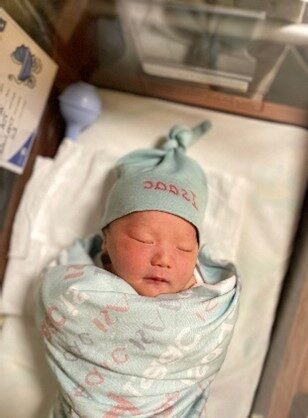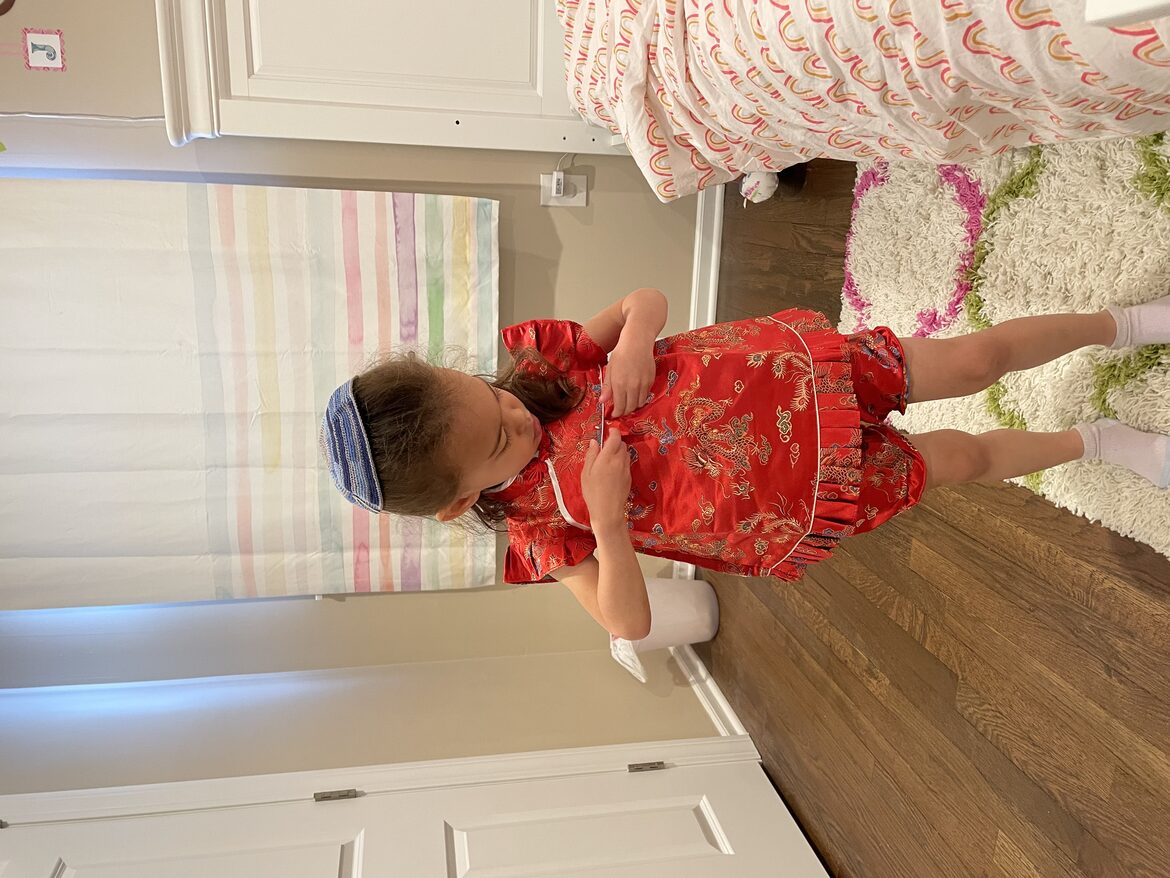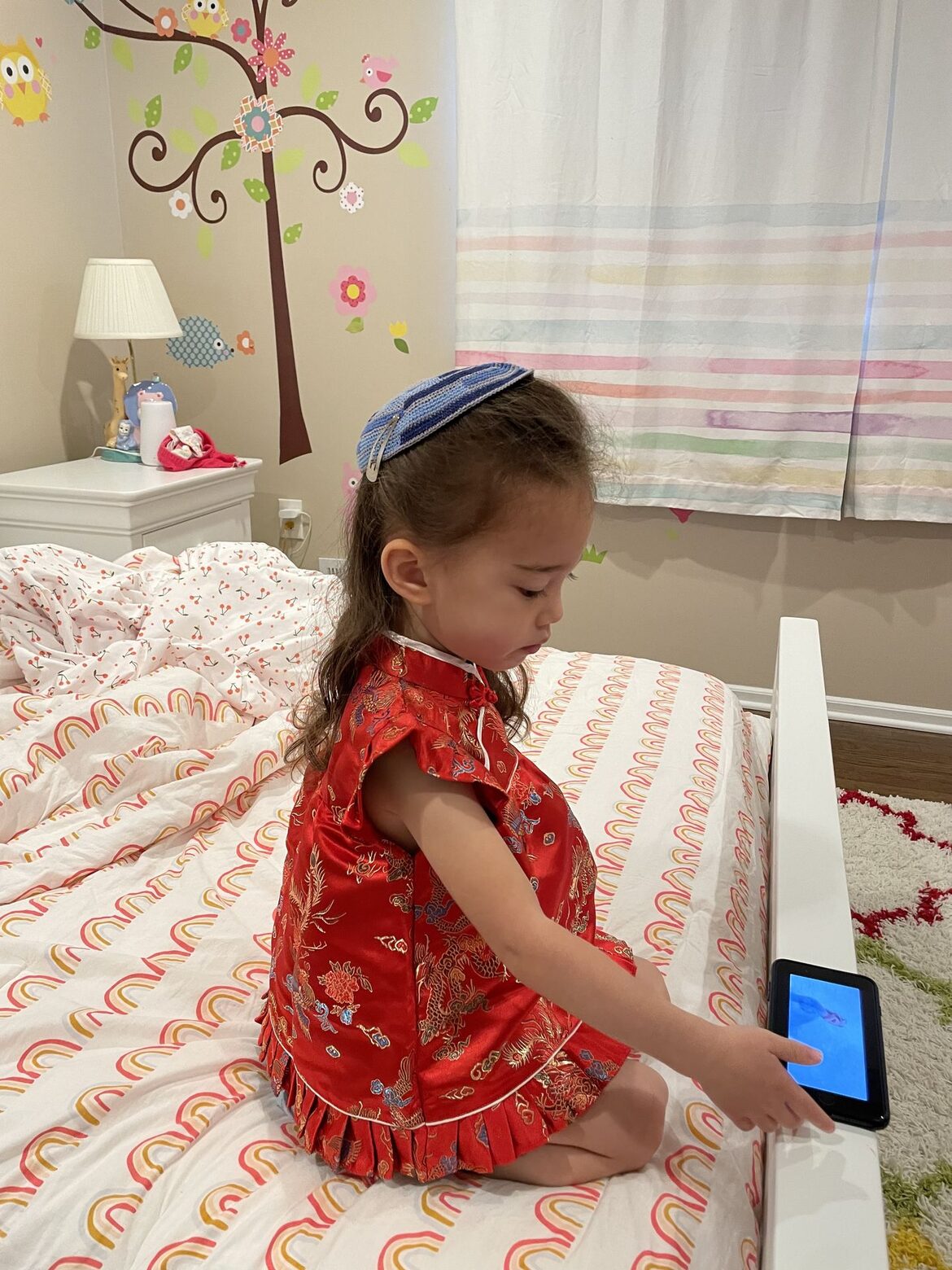
This beautiful baby, son of my nephew Yakov, gets his first name from the Old Testament’s Isaac, and his middle name from an ancient Chinese dynasty and his mother’s family.
Biblical Isaac was the confused son of Abraham, the original Jew. God conv…

This beautiful baby, son of my nephew Yakov, gets his first name from the Old Testament’s Isaac, and his middle name from an ancient Chinese dynasty and his mother’s family.
Biblical Isaac was the confused son of Abraham, the original Jew. God conv…
Many Jews love Chinese food and don’t keep kosher. Offer them “Kosher Chinese Food” and they think, “Death Row Cuisine in a Poorly Funded Prison”. I didn’t grow up in a kosher home, and while my wife’s family kept kosher, they also kept the workarounds. Cover the table with newspape…
It’s Christmas Eve, 2016. Two masked men enter a Chinese family gathering of about fifty people at a home in northern Jersey. Their masks are not ski, stocking, or Halloween. They’re blue surgical. No one else is wearing one or is concerned about the two men who are.

The preschool’s announcement: “Wednesday is Ethnic Day! Come dressed to show the place you came from.”
“Came from?” Okay, Julianna’s grandparents, father’s side, arrived in New York from China and Vietnam in the 1960s, encouraged by communism’s ris…

Okay, kids, let’s line up and celebrate America’s diversity, if only to piss off the nativists.
After Ethnic Day, the preschool sent pictures of the costumed kids, all with faces pixilated. here’s a sari on some girls, a turban on a Sikh (I g…
Most people think eighteen is just a good uniform number for a quarterback. For Jews, the number eighteen (chai, pronounced with phlegm + eye) means “life.” Remember the song in Fiddler? “To life, to life, l’chaim!”
Snap your fingers and dance in…
In the spring of 2014, the third-year students at U of Virginia Law School looked forward to graduation. It was a busy time as they finished their academics and sought permanent jobs. The social highlight was Prom, law school edition.
Tina Z, a third year,…
As far as we knew, the boys in Sara’s life were all Jewish.
There was a Jewish guy she dated during her vegetarian moment, senior year at Marlboro High. He challenged her to eat a hot dog and even offered money to do it. When he got up to two hundred bucks, she …
Most people think eighteen is just a good uniform number for a quarterback. For Jews, the number eighteen (chai, pronounced with phlegm + eye) means “life.” Remember the song in Fiddler? “To life, to life, l’chaim!”
Snap your fingers and dance in a circle.
I pledged a thirty-six-dollar donation to one of the more popular diseases. The solicitor said thanks, but why the weird amount? I told him it was a Jewish thing. Two times chai, once from me, once from my wife. “And if you were my nephew getting married or graduating dental school, and I liked you, you’d get ten, maybe twenty times chai.”
This was news to the fundraiser. He was in Arizona. It was important to me to remind people that Jews donate to popular American charities, not just our own. These days, who knows what they think in Arizona?
Now that my daughter has married into a Chinese family, I’ve learned that eighteen is a good number for her husband’s parents too, because it includes the number eight. Eight is the luckiest Chinese number because the word for it sounds like the word for “wealth”.
My Chinese in-laws celebrate their Lunar New Year with eight days of dinner parties. For Jews, Chanukah and Passover are also eight-day holidays. And a Jewish baby boy gets his ritual circumcision on his eighth day. (Ask him if he’d call that a holiday.)
When the Mandarin Oriental Hotel in Manhattan reopened after the pandemic shutdown, their Feng Shui master insisted the doors open at exactly 12:08. So, rent an apartment on the eighth or eighteenth floor. Start your business on August eighth. Drive an Oldsmobile Delta Eighty-Eight if you can find one.
Another big Jewish number is forty. It rained on Noah’s cruise for forty days. We roamed the desert for forty years. While Moses seemed happy with that number, Lao Tzu might have said, “Moe, what’s with this roaming in the desert for thirty-nine years, ask for directions already. Don’t be a shmendrick.”
Forty includes four, also a big deal number. Lots of Jewish things go in fours. We have the Four Matriarchs. Go ahead Jews, name them. (Hint: Scarlet Johansen is not one of them.) At Passover, we ask the Four Questions; we drink the Four Cups of Manischewitz; we speak of the Four Exemplary Children, etc.
But four and forty are bad numbers for the Chinese. The number four, sz, sounds like the word for “death”. “Sounds like” seems to be big with the Chinese. At daughter Sara and husband Geoff’s wedding, the groom’s parents, our machatunim (ma+phlegm+ah+TOO+nim) wanted no table number four or fourteen. Table forty, thank God, was not an issue.
Chinese also put numbers on people. Sara’s mother-in-law Betsy has eight siblings. They refer to each other by number, one through eight, firstborn to youngest. Don’t ask them, “If Number One dies…does everyone else move up a notch?” But you can wonder about it.
In Amy Tan’s The Joy Luck Club, about her ancestral crowd, Chinese men had multiple wives if they could afford it. They arranged wives in numerical order. Often, seniority got you to Number One, but I bet dowry size or hotness counted, too. Number One wife for a rich guy got the best perks, while Number Four cleaned the toilets. A woman could work her way up (or down) the chart, too. Amy Tan doesn’t say how.
Boy, Chinese husbands had it made back then.
Jewish husbands don’t have this problem. No sane male would marry two Jewish women at once. I’m not telling one of them she’s second.
Adapted from What’s Cantonese for Mazel Tov? a new memoir by Henry Astor Levenstein.
For more misbugas, please visit www.henrylevenstein.com

This beautiful baby, son of my nephew Yakov, gets his first name from the Old Testament’s Isaac, and his middle name from an ancient Chinese dynasty and his mother’s family.
Biblical Isaac was the confused son of Abraham, the original Jew. God conv…
Many Jews love Chinese food and don’t keep kosher. Offer them “Kosher Chinese Food” and they think, “Death Row Cuisine in a Poorly Funded Prison”. I didn’t grow up in a kosher home, and while my wife’s family kept kosher, they also kept the workarounds. Cover the table with newspape…
It’s Christmas Eve, 2016. Two masked men enter a Chinese family gathering of about fifty people at a home in northern Jersey. Their masks are not ski, stocking, or Halloween. They’re blue surgical. No one else is wearing one or is concerned about the two men who are.

The preschool’s announcement: “Wednesday is Ethnic Day! Come dressed to show the place you came from.”
“Came from?” Okay, Julianna’s grandparents, father’s side, arrived in New York from China and Vietnam in the 1960s, encouraged by communism’s ris…

Okay, kids, let’s line up and celebrate America’s diversity, if only to piss off the nativists.
After Ethnic Day, the preschool sent pictures of the costumed kids, all with faces pixilated. here’s a sari on some girls, a turban on a Sikh (I g…
Most people think eighteen is just a good uniform number for a quarterback. For Jews, the number eighteen (chai, pronounced with phlegm + eye) means “life.” Remember the song in Fiddler? “To life, to life, l’chaim!”
Snap your fingers and dance in…
In the spring of 2014, the third-year students at U of Virginia Law School looked forward to graduation. It was a busy time as they finished their academics and sought permanent jobs. The social highlight was Prom, law school edition.
Tina Z, a third year,…
As far as we knew, the boys in Sara’s life were all Jewish.
There was a Jewish guy she dated during her vegetarian moment, senior year at Marlboro High. He challenged her to eat a hot dog and even offered money to do it. When he got up to two hundred bucks, she …
There are currently no blog comments.